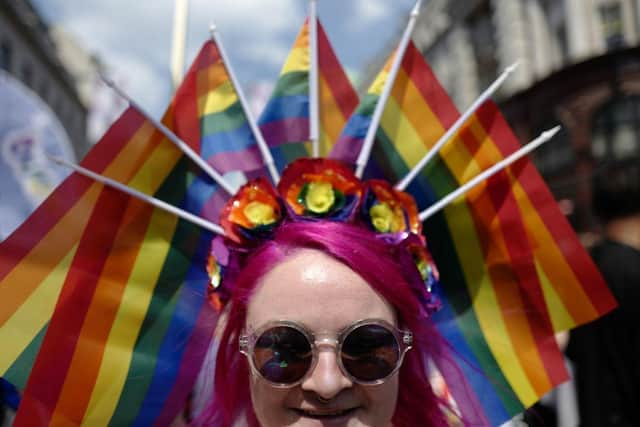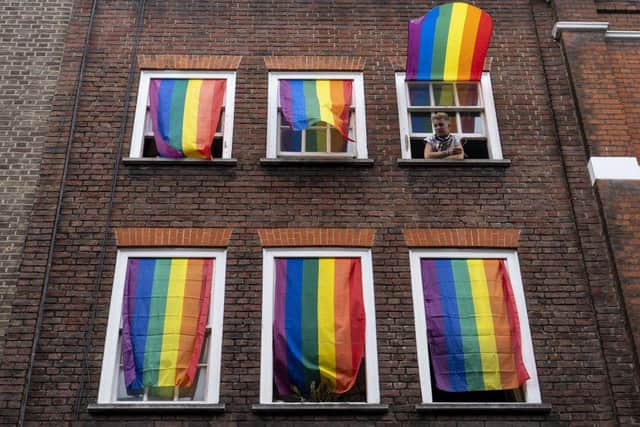What is conversion therapy? Meaning as ban of ‘abhorrent practice’ announced in Queen’s speech – when it starts
This article contains affiliate links. We may earn a small commission on items purchased through this article, but that does not affect our editorial judgement.
and live on Freeview channel 276
The Queen has set out the Government’s programme in her first major public ceremonial appearance since the death of her husband, the Duke of Edinburgh.
Boris Johnson said the Speech set out a plan for “unleashing our nation’s full potential” as the UK recovers from coronavirus.
Advertisement
Hide AdAdvertisement
Hide AdThere were around 30 pieces of legislation promised in the speech, including measures to ban so-called conversion therapy to protect LGBT communities from “abhorrent practices” which can cause mental and physical harm.


"Measures will be brought forward to address racial and ethnic disparities and ban conversion therapy,” said the Queen as part of the speech.
But what is conversion therapy? And why has it taken so long to ban it?
Here is everything you need to know about it.


What is conversion therapy?
Conversion therapy is the pseudoscientific practice of trying to change an individual's sexual orientation using psychological, physical or spiritual intervention.
Advertisement
Hide AdAdvertisement
Hide AdThere is no reliable evidence that a person’s sexual orientation can be changed, and medical institutions warn that conversion therapy practices are ineffective and harmful.
Medical, scientific and government organisations around the world have expressed concern over the validity, efficacy and ethics of conversion therapy, and various jurisdictions across the globe have passed laws against it.
It is a problematic process in that it assumes that homosexuality is a mental disorder or disease in an of itself, and that those who do not identify as heterosexual should want to do so.
Aside from the sociological affects of the practise, the physical treatments – behind which there is no scientific evidence of effectiveness – are damaging to those who undergo them, with often life-impacting results.
Advertisement
Hide AdAdvertisement
Hide AdHistorically, “treatments” like chemical castration, electric shock treatment (often applied to the genitals) and nausea-inducing drugs administered in tandem with the presentation of homoerotic stimuli in an effort to build a negative neural link were used.
Though overtly physical practises may be less common in modern times, the use of counselling, psychoanalytic therapy, prayer, and group support or pressure are still extremely harmful to a person’s well-being, and can leave long lasting psychological scars.
Why has the Government taken so long to act?
The conversation around conversion therapy is not a new one, and as far back as 2018, the Government had outlined plans for gay conversion therapies to be banned.
Following a major survey which more than 108,000 LGBT people responded to (and which found 2 per cent of respondents had undergone conversion therapy and a further 5 per cent had been offered it), the Government said a £4.5 million initiative aimed at making society more inclusive for the LGBT community would be put in place.
Four years on, it still hasn’t come to fruition.
Advertisement
Hide AdAdvertisement
Hide AdFollowing the Queen’s speech, the Government is to launch a consultation on how best to protect LGBT people when it bans the “coercive and abhorrent practice” of conversion therapy.
In a briefing note from Number 10, accompanying the speech, the Government said it will ensure the action it takes is “proportionate and effective, and does not have unintended consequences”.
It said it will ensure that medical professionals, religious leaders, teachers and parents will be able to continue to have open and honest conversations.
It will launch a consultation before details of the ban are finalised in order to hear from a wide range of people.
Advertisement
Hide AdAdvertisement
Hide AdThe Government Equalities Office (GEO) said the consultation will seek views to ensure that the ban can address the practice “while protecting the medical profession, defending freedom of speech, and upholding religious freedom”.
As soon as parliamentary time allows, and following the consultation, the ban will be introduced in legislation.
The charity Stonewall welcomed the commitment but said news of a consultation “is concerning and will be hard for our communities to hear”.
Chief executive Nancy Kelley said: “We don’t need a consultation to know that all practices that seek to convert, suppress, cure or change us are dangerous, abusive and must be banned.
Advertisement
Hide AdAdvertisement
Hide Ad“Lesbian, gay, bi, trans, intersex and ace communities have been waiting almost three years for the UK Government to follow through on their promise to ban all conversion practices, and any delay leaves us at further risk of abuse.”
There is no specific time frame for the consultation but the Government wants it to be “short and prompt”, the Prime Minister’s official spokesman said.
A ‘hostile environment’ for LGBT people
In March 2021, Boris Johnson said ending conversion therapy would be “technically complex”, but insisted that ministers will “stamp it out” after three members of the Government’s LGBT advisory panel resigned in protest.
The Prime Minister said he would work to end the “abhorrent” practice after his Government came under damning criticism for allegedly creating a “hostile environment” for LGBT people.
Advertisement
Hide AdAdvertisement
Hide AdJayne Ozanne, the first of the advisers to quit, cited delays to banning the pseudoscientific process as among her many complaints of ministers.
She was followed by James Morton, who had reportedly been “very concerned for several months” that Ms Truss and her junior ministers were “not committed to LGBT equality”.
Ellen Murray became the third person to quit the panel – writing on Twitter that she decided to leave “due to the Government’s persistent and worsening hostility towards our community in myriad areas”.
In April, the Government’s LGBT advisory panel, established by Theresa May’s government was disbanded, a move that led to accusations that the Government was failing to rebuild trust with LGBT communities.
A message from the editor:
Advertisement
Hide AdAdvertisement
Hide AdThank you for reading. NationalWorld is a new national news brand, produced by a team of journalists, editors, video producers and designers who live and work across the UK. Find out more about who’s who in the team, and our editorial values. We want to start a community among our readers, so please follow us on Facebook, Twitter and Instagram, and keep the conversation going.